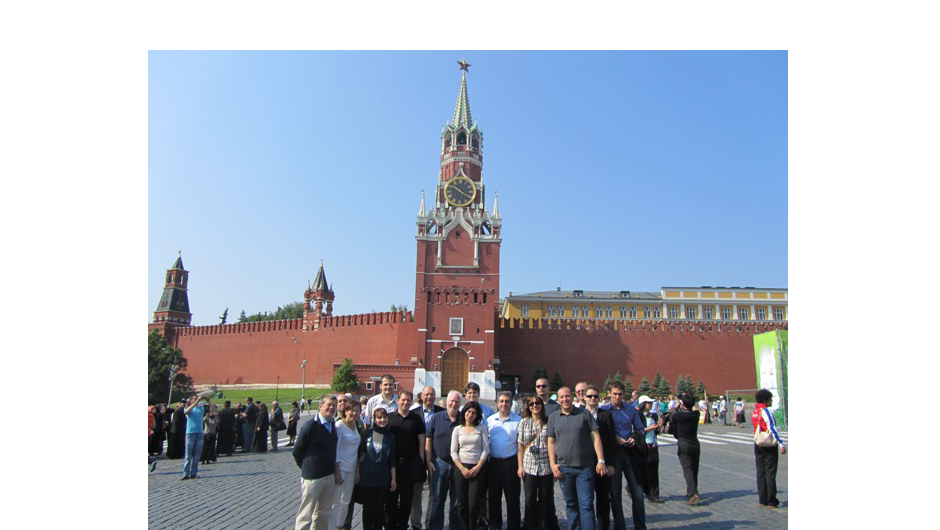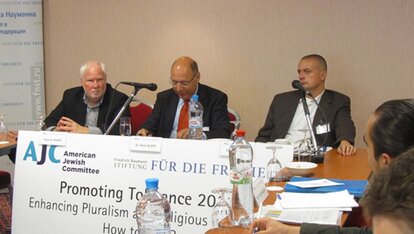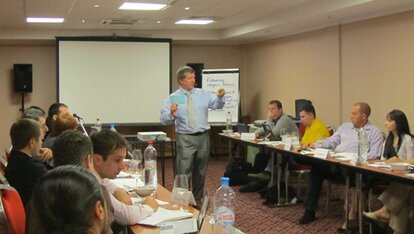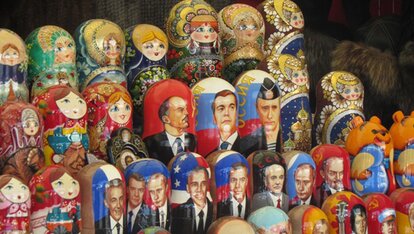“Promoting Tolerance” 2011: The Liberal Approach to Strengthening Pluralism

The participants - young decision-makers in the field of government, academia and civil society
Friedrich Naumann Foundation for Freedom (FNF) and the American Jewish Committee (AJC) will implement in 2011 – as they have during the previous 19 years - the international programme “Promoting Tolerance” for young decision-makers in the field of government, academia and civil society. The questions and issues to be discussed are what obstacles remain to establishing more tolerant, non-violent, engaged and liberal societies in the Foundation’s region of Central, Southeast and Eastern Europe, Caucasus and Central Asia (CSEE). In 2011 the focus is on “pluralism and religious tolerance”.

René Klaff, Rabbi Andrew Baker and Sascha Tamm
The programme started at the beginning of the year with an ‘online stage’ focused on the topic “Minority Rights and Religion”, which introduced the minority issue, the principle of good relationships between nations and the basics of civil and human rights. In May, participants came to Moscow from Armenia, Azerbaijan, Serbia, Croatia, Kyrgyzstan, Russia, Bulgaria, Hungary, Slovakia, Romania and Ukraine for a two-day introductory seminar entitled “Enhancing Pluralism and Religious Tolerance. How to do it?”.
René Klaff, Director of the Regional Office CSEE, and Rabbi Andrew Baker, Head of the International Affairs Department at the AJC, introduced this important but sensitive issue. They stressed the great importance of promoting pluralism, peaceful coexistence, understanding and the recognition of religious and ethnic minorities through the work of the two partner organizations.

The work session of the seminar
With the capable facilitation of Stefan Melnik, the work session of the seminar started with statements by the participants on the coexistence of different religious groups in their home countries. Intensive discussions followed on the sometimes difficult relationship between supporters of the majority and minority religions as well as on specific issues in the individual countries (such as the problem of having a state religion, discrepancies in the regulatory framework, the recognition of religious communities, the problem of the restitution of property to religious institutions, and religious education).
A special panel of the event was dedicated to the relations between the various religions and the relationship between state and religion in Russia. Russia has a chequered history of inter-ethnic and inter-religious relations, which is also reflected in today's political discourse. The country has experienced periods of religious tolerance, but also times of significant intolerance. Evgeny Gontmakher and Grigory Shvedov, both prominent alumni of the programme, spoke about the social and economic grounds of intolerance in Russia and about the role of Islam in the North Caucasus. Sascha Tamm, project manager for Russia and Central Asia, gave an overview of the relationship between the state and the Orthodox Church and its impact on other religious communities in Russia.
Based on the information gathered so far, the participants discussed liberal views on freedom of religion, on the relationship between government and minorities, possible political solutions to ethnic, cultural and religious conflicts and the future of the multi-religious countries in Europe. Representatives from previous rounds of the programme participated by making interesting proposals for concrete approaches to conflict prevention in connection with minority issues.
Following an intensive exchange of opinions and heated discussions, the participants agreed that simple tolerance and toleration are not in themselves sufficient for a truly pluralistic society. The promotion of tolerance requires an active commitment and sustained efforts for mutual understanding. Moreover, the establishment of a democratic, secular state with the rule of law and the development of a strong civil society are prerequisites for peaceful coexistence in any multi-religious and multicultural society. The participants emphasized the importance of dialogue, pooling experience and dissemination of information for resolving the specific problems connected to achieving higher levels of tolerance in each country, mutual understanding and recognition. An essential task is to actively implement the previously discussed approaches into the decision-making processes of the liberal organizations in the participants’ home countries.

Moscow proved a fitting setting for this event
The multi-ethnic and multi-religious city of Moscow proved a fitting setting for this event. The cultures of different ethnic and religious minorities, as well as the peculiar relationship between state and religion that has evolved over the centuries, have left their mark. The participants themselves could get a feel for this on the last day of the seminar during a walking tour of politically and religiously diverse Moscow.
The programme “Promoting Tolerance” will bring together the participants one more time in November for a ten-day study tour in the USA. The group will visit several U.S. cities at the invitation of the AJC and will discuss the American experience of pluralism and integration of minorities with representatives of political, religious and civil society organizations, mainly from the Jewish minority.
Neli Kaloyanova